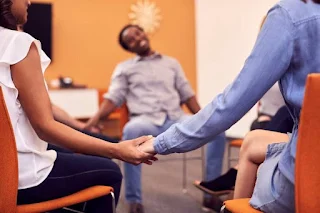How Group Therapy Benefits and Empowers
🔗 Shared Experiences & Validation
Group therapy brings together individuals facing similar challenges, helping participants realize they are not alone. This sense of shared experience reduces isolation, and validation from peers fosters empathy and emotional safety :contentReference[oaicite:1]{index=1}.
💬 Diverse Perspectives & Learning
- Members bring varied backgrounds, offering unique insights and solutions :contentReference[oaicite:2]{index=2}.
- Constructive peer feedback enhances self-awareness and highlights blind spots :contentReference[oaicite:3]{index=3}.
🤝 Modeling & Skill Practice
Participants learn by observing positive behaviors in others—whether communication, emotion management, or conflict resolution—and practice these skills in a safe setting :contentReference[oaicite:4]{index=4}.
📈 Accountability & Motivation
- Regular attendance and sharing of progress encourage commitment to therapeutic goals :contentReference[oaicite:5]{index=5}.
- Seeing peers’ successes can be motivating and foster hope :contentReference[oaicite:6]{index=6}.
💡 Support & Emotional Resilience
Group members provide encouragement, emotional support, and mutual empathy, strengthening resilience and well-being :contentReference[oaicite:7]{index=7}.
💰 Cost-Effectiveness
Shared sessions lower per-person costs compared to individual therapy—an accessible option for many seeking ongoing mental health support :contentReference[oaicite:8]{index=8}.
🧠 Therapeutic Factors
- Universality: Recognizing that others share similar struggles reduces shame :contentReference[oaicite:9]{index=9}.
- Altruism: Helping others increases self-worth and well-being :contentReference[oaicite:10]{index=10}.
- Cohesiveness & Catharsis: Feeling part of a supportive group facilitates emotional expression and healing :contentReference[oaicite:11]{index=11}.
- Interpersonal learning: Feedback from peers helps participants understand how they affect others :contentReference[oaicite:12]{index=12}.
⚠️ Considerations & Limitations
- Individual issues receive less time than in one-on-one therapy :contentReference[oaicite:13]{index=13}.
- Scheduling group sessions may be inflexible :contentReference[oaicite:14]{index=14}.
- Group dynamics can cause discomfort or conflict for some members :contentReference[oaicite:15]{index=15}.
- Confidentiality is communal—some may be less willing to share openly :contentReference[oaicite:16]{index=16}.
🔍 Ideal Applications
Group therapy formats include psychoeducational, CBT, DBT, support, and interpersonal process groups—each tailored to different needs such as depression, anxiety, PTSD, and substance concerns :contentReference[oaicite:17]{index=17}.


